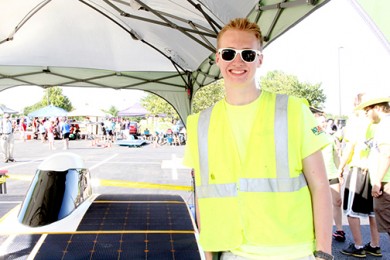Speeding down the highway, a small car starts on a cross-country race. Built entirely by students, it’s an experiment in engineering. Holding one person, it runs off sunshine and shows no sign of stopping.
The annual American Solar Challenge (ASC) rolled through Kansas City July 24 with Blue Valley 2013 graduate Jackson Walker.
Walker’s school, Principia College, has consistently participated in this race, and this involvement prompted Walker to choose that college.
“It’s a major draw that brought me to the college because I like computers and math and science and things like that,” Walker said. “I was like, ‘That’d be a good reason to come to this school, to be involved in that.’ So, I got involved. I started working really hard, and they picked me to go on the race.”
The competition is open to colleges and students from all around the world. Teams must design and build a solar-powered vehicle within the requirements set by the ASC with the hopes of making the 1,700 mile cross-country journey.
Not just any team with a functioning solar car can enter the challenge. Each one must have submitted blueprints as well as construction information to be considered.
To reduce weight, previous Principia cars had three wheels. However, this year’s design, Ra9, had four.
“What we’re doing is designing our car to meet future regulations for future races,” Walker said. “We want to go to Australia next year, and they’re going to require a four-wheel vehicle. Instead of designing a new one next year and rebuilding it, we decided to build a four-wheel car that could handle this race and the next races. Instead of specializing in one arena, we just built a general car that met regulations for everything, so we don’t have to redo it.”
If all design standards are met, cars were sent to the Formula Sun Grand Prix (FSGP) to be tested and scrutinized. Each car had to complete either 60 laps in one day or 90 laps over two days with different drivers to ensure the vehicle was suitable for the journey.
The teams who completed the race started their journey in Austin, Texas, and eventually made their way up to Minneapolis, Minnesota.
A KC energy and infrastructure company, Black and Veatch, hosted the participants for one night on the eight-day road trip. The race commenced on July 21 and came to Overland Park, Kansas, on July 24. Each night had a checkpoint in various states along the route.
Teams faced difficulties along the way such as conserving energy on cloudy and rainy days, breakdowns and simple fatigue.
One car stored in the bay next to Principia’s car caught on fire early in the qualifying stage of the race, causing the sprinklers to go off and flooding the Ra9.
“We had to rip out everything in the car and rebuild it in one day and get back on the track and qualify,” Walker said. “In order to do that, we had to split [our qualifying laps] over two days. We didn’t even get the number of laps, but they made an exception because we were able to show it’s road-worthy even after ripping it apart after water damage.”
The winner was determined by which team had the shortest elapsed time. So even if a team got to the finish line first, another team who completed it with an overall faster time would win.
With the 23 colleges registered and nine teams qualifying to race, Walker came in fifth.
As of June 24, Walker said the highlight of the race was recovering from the fire incident.
“All these teams pitched in to help us get back on our feet, and that’s what this is about,” he said. “It’s about camaraderie. Winning is cool and all, but there are certain teams that are going to do better than others. So, winning isn’t everything. It’s about the learning and the friendship that happens.”
Blue Valley graduate participates in American Solar Challenge, makes stage stop at local engineering firm
Gennifer Geer and Sheila Gregory, Managing Editor and News Editor
August 18, 2014




